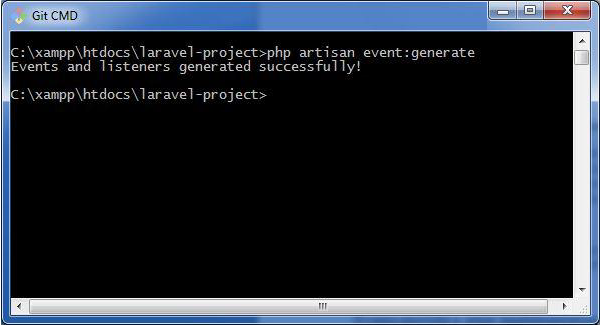
- Laravel - Home
- Laravel - Overview
- Laravel - Installation
- Laravel - Application Structure
- Laravel - Configuration
- Laravel - Routing
- Laravel - Middleware
- Laravel - Namespaces
- Laravel - Controllers
- Laravel - Request
- Laravel - Cookie
- Laravel - Response
- Laravel - Views
- Laravel - Blade Templates
- Laravel - Redirections
- Laravel - Working With Database
- Laravel - Errors & Logging
- Laravel - Forms
- Laravel - Localization
- Laravel - Session
- Laravel - Validation
- Laravel - File Uploading
- Laravel - Sending Email
- Laravel - Ajax
- Laravel - Error Handling
- Laravel - Event Handling
- Laravel - Facades
- Laravel - Contracts
- Laravel - CSRF Protection
- Laravel - Authentication
- Laravel - Authorization
- Laravel - Artisan Console
- Laravel - Encryption
- Laravel - Hashing
- Understanding Release Process
- Laravel - Guest User Gates
- Laravel - Artisan Commands
- Laravel - Pagination Customizations
- Laravel - Dump Server
- Laravel - Action URL
Laravel - Event Handling
Events provide a simple observer implementation which allows a user to subscribe and listen to various events triggered in the web application. All the event classes in Laravel are stored in the app/Events folder and the listeners are stored in the app/Listeners folder.
The artisan command for generating events and listeners in your web application is shown below −
php artisan event:generate
This command generates the events and listeners to the respective folders as discussed above.

Events and Listeners serve a great way to decouple a web application, since one event can have multiple listeners which are independent of each other. The events folder created by the artisan command includes the following two files: event.php and SomeEvent.php. They are shown here −
Event.php
<?php
namespace App\Events;
abstract class Event{
//
}
As mentioned above, event.php includes the basic definition of class Event and calls for namespace App\Events. Please note that the user defined or custom events are created in this file.
SomeEvent.php
<?php
namespace App\Events;
use App\Events\Event;
use Illuminate\Queue\SerializesModels;
use Illuminate\Contracts\Broadcasting\ShouldBroadcast;
class SomeEvent extends Event{
use SerializesModels;
/**
* Create a new event instance.
*
* @return void
*/
public function __construct() {
//
}
/**
* Get the channels the event should be broadcast on.
*
* @return array
*/
public function broadcastOn() {
return [];
}
}
Observe that this file uses serialization for broadcasting events in a web application and that the necessary parameters are also initialized in this file.
For example, if we need to initialize order variable in the constructor for registering an event, we can do it in the following way −
public function __construct(Order $order) {
$this->order = $order;
}
Listeners
Listeners handle all the activities mentioned in an event that is being registered. The artisan command event:generate creates all the listeners in the app/listeners directory. The Listeners folder includes a file EventListener.php which has all the methods required for handling listeners.
EventListener.php
<?php
namespace App\Listeners;
use App\Events\SomeEvent;
use Illuminate\Queue\InteractsWithQueue;
use Illuminate\Contracts\Queue\ShouldQueue;
class EventListener{
/**
* Create the event listener.
*
* @return void
*/
public function __construct() {
//
}
/**
* Handle the event.
*
* @param SomeEvent $event
* @return void
*/
public function handle(SomeEvent $event) {
//
}
}
As mentioned in the code, it includes handle function for managing various events. We can create various independent listeners that target a single event.